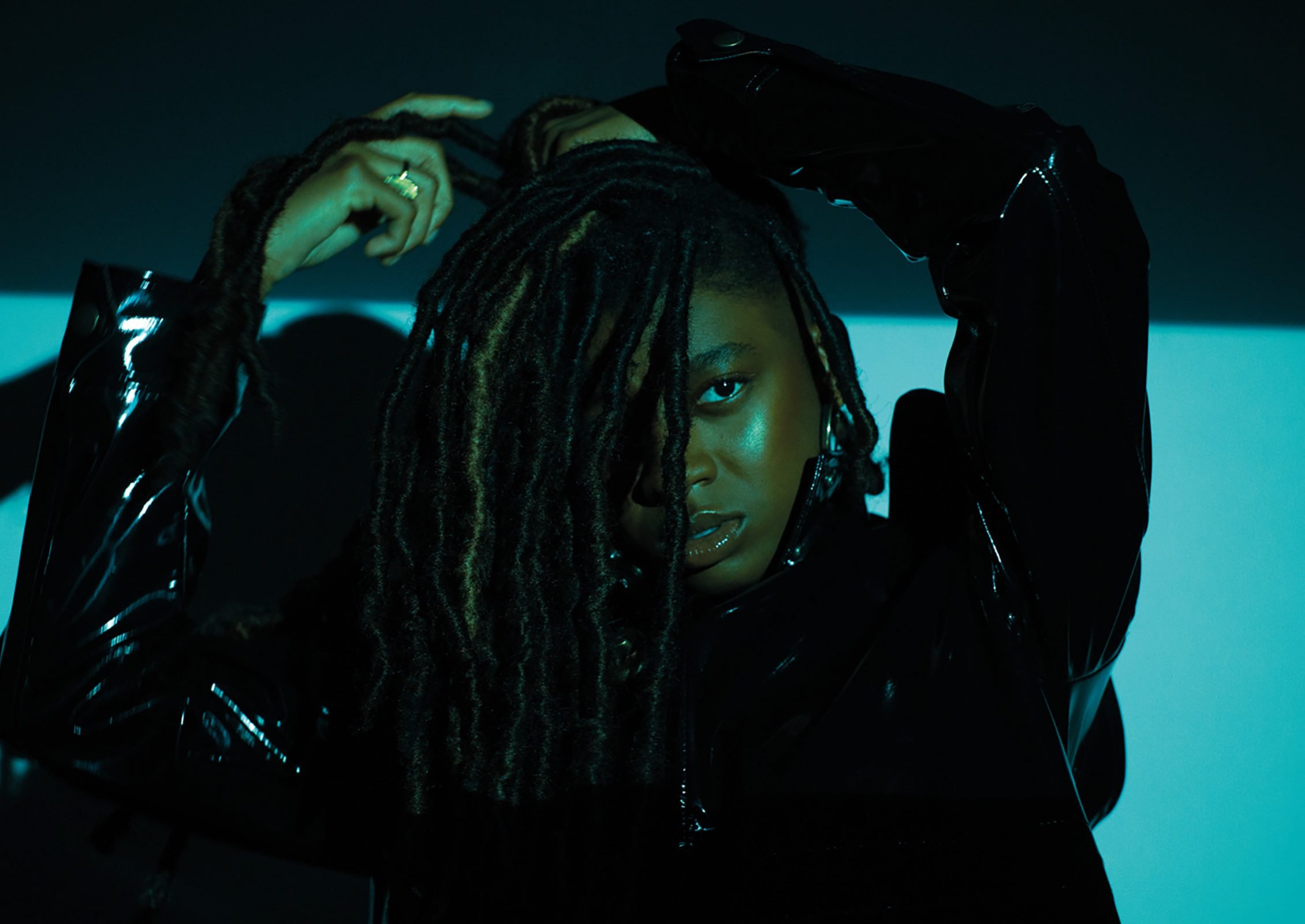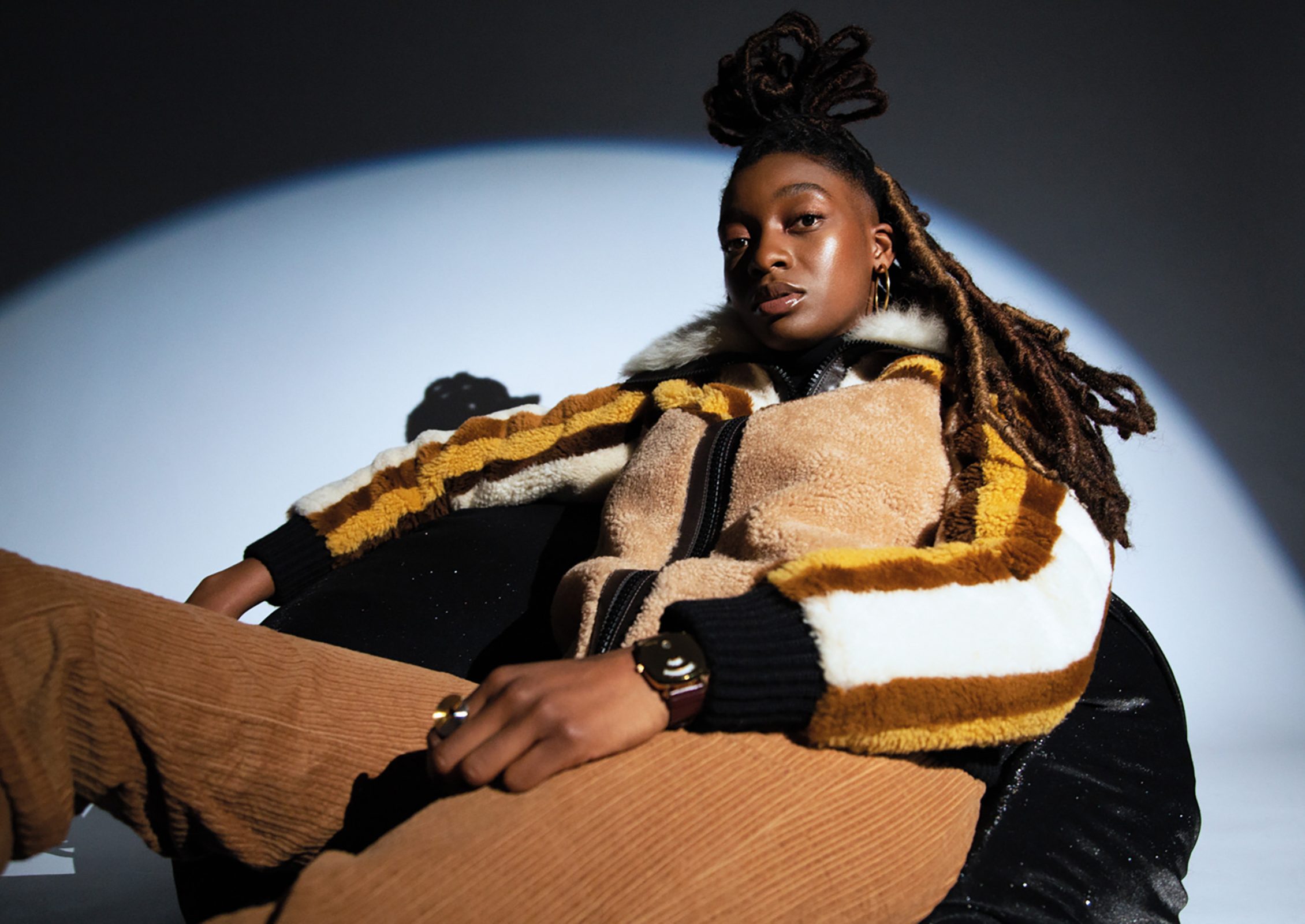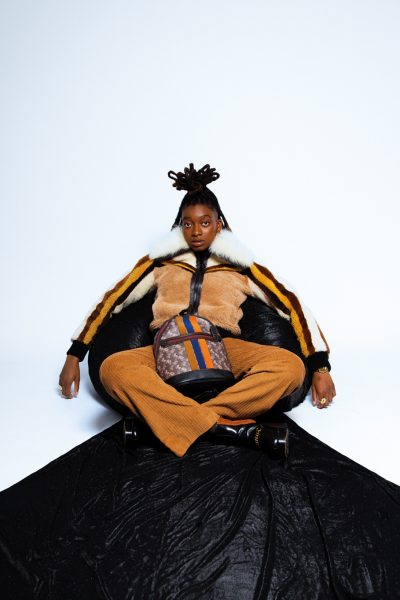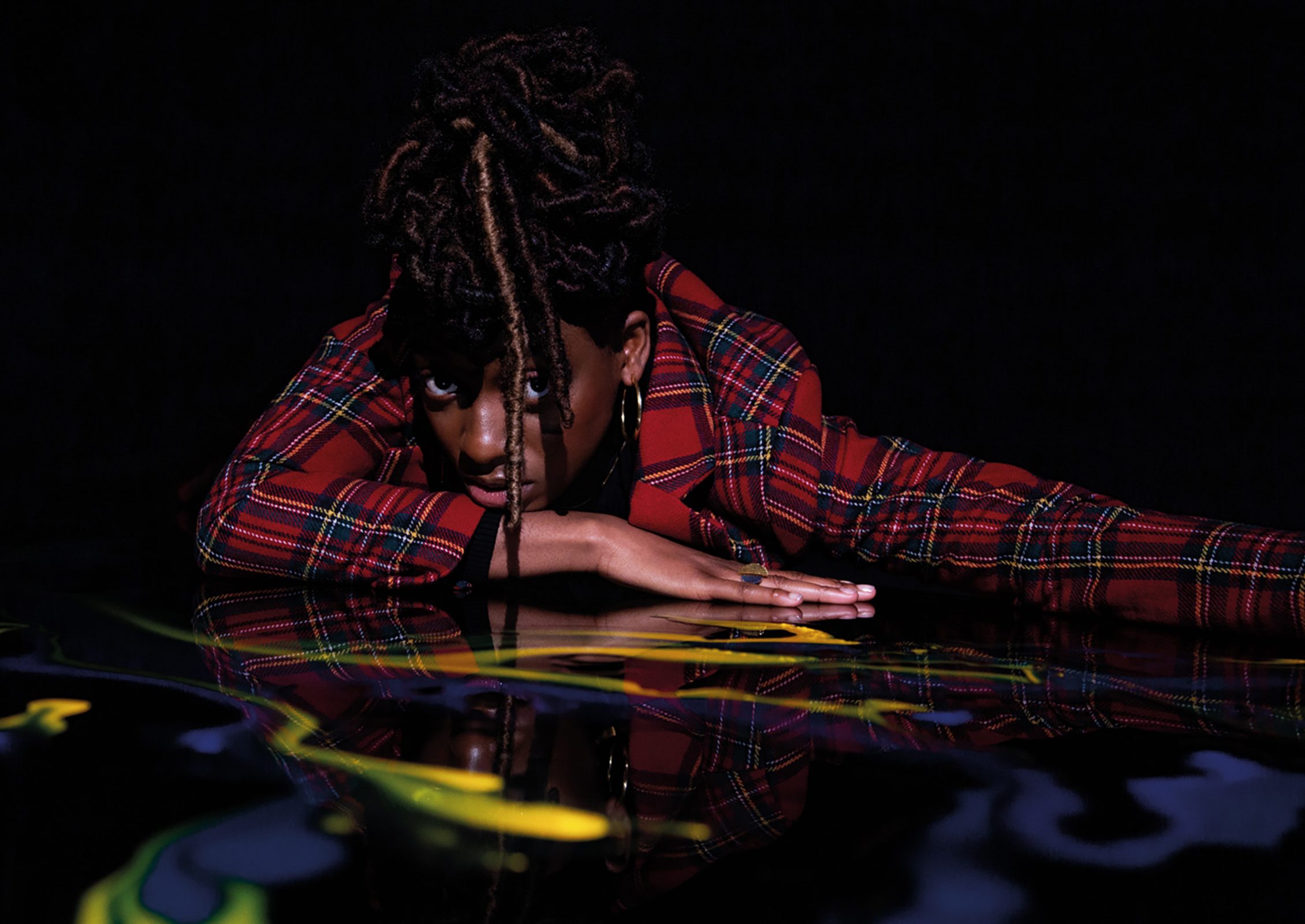- Little Simz wears Coach
- Words Thomas Hobbs
- Photography Lusha Alic
- Styling Aisha Nova
- Hair Lauraine Bailey using Nature Spell
- Makeup Francesca Daniella using YSL Beauty
- Set Design Ranya El-Refaey
- Production Fernanda Dugdale for Studio Notion
Some artists go stratospheric with their first single, but for Little Simz, star of the fourth cover of Notion 86, getting recognised as an elite rapper has been more of a fight...
Some artists go stratospheric with their first single, but for Little Simz — real name Simbiatu Ajikawo — getting recognised as an elite rapper has been more of a fight. Despite winning co-signs from Kendrick Lamar and JAY-Z, and releasing a series of colourful albums and mixtapes — starting with 2010’s STRATOSPHERE — which arguably took UK storytelling rap to new heights, Simz’ name became synonymous with ‘flying under the radar’. A stance perfectly summarised by a 2016 VICE headline that read: “Little Simz is Pioneering UK Rap, So Why Won’t the Industry Support Her?”
“I remember watching all these artists blow up left, right and centre, and thinking ‘none of them are that good’. I just didn’t get it,” Simz reflects. “I’m not even trying to sound like a hater, but none of them could rap as good as me. I was sitting on gold, yet no one wanted to fuck with me. It felt like the fact I was a woman played a part, and it was really tough knowing that.” Simz’ third studio album, 2019’s Grey Area, is the sound of a 25-year-old losing her hang-ups and inhibitions. She raps with an urgency, like it might be her last ever moment to express herself, spitting bars like “See God when you look me in my eyes”, with an unshakeable confidence that makes you feel like you’re dealing with a powerful mythical force. You can tell writing this music, which shifts between acrimony (“Pressure”) and nostalgic euphoria (“101 FM”) at a blistering pace, was cathartic for Simz, providing her with an opportunity to make a bold record that no one would be able to deny this time around. Over the 10 tracks, it’s as if her back is against the wall and she’s ready to take on the world.
On “Venom”, she thrillingly transitions from anger (at one point, Simz spits: “Fuck those who don’t believe / they will never admit I’m the best here / from the mere fact that I’ve got ovaries”) to sheer elevation (“My soul has ascended to the sky”) — it’s the sound of Simz levelling up in real-time. Over the track’s haunting, grandiose strings and ferocious, stabbing drums, Simz channels her disillusionment with the music industry into her very own superhero theme.

- Jacket Coach
- Coat & Shirt JW Anderson
- Jewellery Kloto
Nonchalantly referring to her male counterparts as “pussies”, she’s almost de-emasculating them, and letting them know that gender won’t stop her from fathering them, especially when it comes to skill. “That’s basically the blueprint of not just ‘Venom’, but the whole album,” Simz confidently agrees. “With ‘Venom’, in particular, it was about taking all that anger I had from feeling like the underdog and just absolutely losing it and blacking out. I knew after that song some people, particularly the men, wouldn’t be able to ignore me any longer. It was about channelling something raw, and getting it out of my system so I could move forward.”
The fact that Simz is speaking today from São Paulo (where she is performing at Popload Festival) is a testament to just how big of a year she’s enjoyed in 2019. Grey Area is deservedly one of the year’s most critically acclaimed albums (picking up a Mercury Prize nomination), while her role as Shelley in Netflix’s hit London gang drama, Top Boy, brought necessary heart and wisdom to a show etched in the darkness of toxic masculinity. She’s no longer a domestic star, but an international one too.
It feels like the world is finally catching up with Little Simz. As an artist, her concepts — particularly 2016’s criminally underrated psychedelic rap opus Stillness in Wonderland, an album about the escapist power of fantasy when you feel fundamentally misunderstood and feared by society — and approach as a female artist not defined by her sexuality, have always been a few years ahead of their time, with the industry almost playing catch up. All those years of sitting in her room depressed, wondering why her name wasn’t featured prominently on festival line-ups or radio stations weren’t putting her singles on playlists, are thankfully now becoming a thing of the past. “It’s mad because I’m actually living in my dream right now. I’m literally present in it!” she adds, letting out a gentle laugh.
“I’m not going to lie and say there haven’t been some tough moments, but I always knew I’d get to this place. When I was younger, I would dance, act, sing, but from the age of 14, I just knew I was going to make it as a rapper. I felt it deep inside. I just needed to go through some shit to get here. It’s made me stronger. I know what it means to fight, and that gives me a competitive advantage. If I’m also glad I didn’t blow up three or four years ago, as I wouldn’t have been ready for it then.”
These “tough times” are referenced explicitly on “Wounds”, a painful song which sees Simz reflect on one of her best friends being murdered, and how the media tends to dehumanise working-class black people caught up in violence. It’s also a poignant reminder that just because Simz made it out and is now living the life she always dreamed of, she’s still a rarity. Even though Simz tends to avoid reflecting on her childhood growing up in Islington, this song reinforces just how far she has come.
When she performs with a megaphone on stage rather than a traditional microphone, something which has become the epicentre of her live shows, it is a statement of intent; it’s Simz way of saying that for too long it’s only been the wrong kind of voices that have been amplified by the mainstream, but now it’s a woman’s turn to lead. As the 2020s arrive, you wouldn’t bet against Simz cementing her status as a legend by the time it’s over.

- Jacket & Trousers Coach
Thomas Hobbs: Your music really brings the listener right into your head, whether it’s to see something beautiful or something ugly. On a song like “Selfish”, for example, you flip between being supremely confident and depressed. I guess black women are so often relied on to be strong… do you feel like it’s important to show there’s a limit to this, too?
Little Simz: I’ve grown up with strong black women — whether that’s being raised by a single black woman or having two sisters that are older than me — so I know exactly what a strong black woman feels and looks like. But I can also see how having to keep up that confident image could also impact your mental health. Trying to always be strong so you can uplift others, and making it so no one ever sees you crying, is something people expect of us, but crying doesn’t make you weak.
People who have gone through some shit are actually stronger than the rest of us. I want my music to show black women that it’s okay to cry, it’s okay to vent, and you’re allowed to talk about how you feel. I want to empower them so they don’t have to sweep things under the carpet.
TH: There’s always been something cinematic about the way you rap. Tracks like “Dead Body” or “The Lights”, really make you visualise the worlds you’re talking about and see those societal pressures young people face. Do you feel like a mouthpiece for the younger generation?
LS: My voice is my voice, but I’m still, I guess, representing for a certain type of person who doesn’t have the courage to speak up. When I try and put a story in a rap, I want it to be universal; not everything I rap about is something I have experienced first hand, but it’s things going on outside your window that you might ignore. But as emotional as I am, and as sensitive and deep as I can be, it’s important I have fun too and maintain that kind of balance.
That’s one of the reasons it took people a while to get into my music, as it was a lot darker before. Not everyone wanted that. I now understand that you need to mirror the cinema in that not every film can be a horror story. You need a comedy, a romantic film, a drama – you need that mix. I am getting to a place now of opening up more and realising I need to show people what it’s like when I’m both happy and sad, as maintaining that balance ultimately makes me more human.
“I JUST KNEW I WAS GOING TO MAKE IT AS A RAPPER. I FELT IT DEEP INSIDE. I JUST NEEDED TO GO THROUGH SOME SHIT TO GET HERE. IT’S MADE ME STRONGER. I KNOW WHAT IT MEANS TO FIGHT, AND THAT GIVES ME A COMPETITIVE ADVANTAGE.”

- Jacket, Trousers, Backpack & Shoes Coach
TH: Could you ever see yourself stepping behind the camera and directing?
LS: One-hundred-percent. I’m super into photography so I love being behind the lens and controlling things. But I would never direct a film half-heartedly or just because I’ve got a bit of a profile. If I do it, I want to win respect from the film community. There needs to be more black filmmakers, but if I do something I want to be the best at it.
TH: Back to the music, but your lyricism has always reminded me of how Amy Winehouse used to write songs. It’s so raw and a real window into your soul. Is that the kind of songwriter you want to mirror?
LS: When you work with someone like Inflo [the primary producer on Grey Area and Simz’ childhood friend], who wants to push the envelope and make the music as diverse as possible, it’s hard not to make something that’s magical and really personal. With Amy, I just loved how raw she was, and how open and direct the words were. As I am getting older, I’m appreciating that so much more. Even outside of music, just in daily conversations and stuff, I’m not here for faffing about. I just want to get straight to the point, and I like it when people don’t have an agenda. The best songwriters cut right to the core of their being, and Amy did that, and that’s why you can see her influence on me.
Equally, like, yo, I don’t want to fucking go through something traumatic every time I hit the studio in order to write a great album. I want to get used to making music from a place where I feel genuinely happy. That’s so important if you’re to have longevity. With a song like “101 FM”, there was no blueprint for writing something that bright and sparky. I just knew it was important I had fun, especially at a time where young black people always have such serious headlines in the media. It was an escape.
TH: I feel like you went into all these songs envisioning how they would also play out on a live stage, especially tracks like “Venom” and “Boss”, which just have this playful bounce to them. So many rappers sleepwalk their way through live shows, is it important you’re the antithesis to that?
LS: I’m someone who, when I make a song, I just imagine performing it and how it will go down as I love live shows so much. So when I actually get the opportunity to go out there and tour, I already know the audience will be singing stuff back. It’s insane as live performances really show who is really about this shit and who is faking it. I’ve listened to so many albums that I love and I’ll go see the live show and it doesn’t do it for me. You start to think maybe certain artists are only good at making studio recordings and can’t translate it to a stage. That’s okay and everything, but that will never be me. I’m about the music experience as a whole. When you see Little Simz, it’s just me doing these mad flows and I’m jumping up and down, and I’m keeping in time, and it’s like: ‘Yo, I’m really working up here!” So when I see other people cheat their way out of it, I’m just not respecting it.

- Blazer CECILIE COPENHAGEN
- Earrings Kloto
TH: People don’t give you enough credit for how hard you’ve worked, and the press around Grey Area, can feel like we’re talking about a debut artist. Is that frustrating and does it genuinely feel like you’re experiencing that more just because you’re a woman, who hasn’t come into the game with a hyper-sexualised image?
LS: People are still playing catch up and I think they like to wait and see how much you can endure before deciding to give you an opportunity, especially if you’re a woman. I almost had to release seven EPs and four mixtapes just to enter the conversation. In their minds it’s like: ‘Yeah, cool she released that Grey Area shit, but can she do it again!?’ You know what I’m saying? It’s fine, it doesn’t bother me because I know I’m a creative and I know what I’m capable of, and I know what I want. But people are not just going to willingly give you that opportunity, you almost have to fight and prove that you’re capable of doing shit, over and over.
TH: Are we making progress at all when it comes to female representation in rap?
LS: I think we’re progressing in that area for sure. I see a lot of women, you know, that are not hyper-sexualised and that are not just selling sex. They’re truly themselves and that’s cool. For sure there’s definitely a way to go, but if your music is hyper-sexualised then that’s fine too! I think women are beautiful and it is what it is, like it’s not a problem, but it becomes a problem when it’s not them and the sexual side is just to sell records. Music that doesn’t come from a real place doesn’t age well.
TH: What can we expect from the music you’ve got coming up. I know you have a song with Rico Nasty recorded. That sounds like it will be killer!
LS: It’s just pure energy. Obviously I love Rico’s music, but I don’t get in the studio with many people who I connect with like Rico. We did something super quick, but I think when you just have that thing with someone and it truly clicks then it’s effortless.
TH: What about Kendrick? I know he’s become somewhat of a mentor. I could imagine you guys trading bars… does he give you advice?
LS: He messed with me before I was making Grey Area type music, and that meant so much. He knew I was saying something different. He’s just such a calm, centred person, and you can really tell he lives and breathes this music shit. He listens to rappers and champions them before they have a hit single. He knows how to keep grounded and that’s something I have learned a lot from.
TH: If you could speak to teenage Simz now, is there anything you’d advise?
LS: The main thing I would probably say is to do more research on the music business, just to get a deeper understanding of how publishing works and how things split. My business shit is tidy now, but no one teaches you this stuff. It is trial and error. When it comes to young women coming into this game, I am really thinking about how I can advise them on business, but I would never tell someone to be independent or signed, as that’s instinctual and something only you can choose. I would tell teenage Simz that paying off a mortgage is a lot cooler than buying loads of clothes or diamonds.
LS: Where do you see yourself in 10 years time? It would be a crime if you weren’t headlining Glastonbury.
LS: So, what, when I’m 35? Nah, I want to do it way sooner than that. I see myself doing this music thing for a long, long time. Right now, it would be easy to get gassed up, but I am managing everything pretty okay. I guess I know you have to work hard to be seen as the greatest. It’s cool that more people know my name now, but I know there’s still a lot of work to be done.

- Coat & Shirt JW Anderson
- Earrings Kloto




